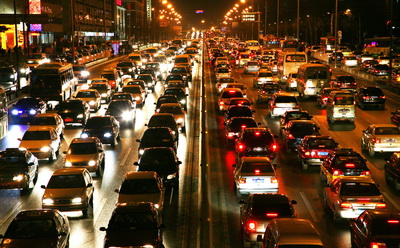

Beijing's Traffic Restrictions Are Not a Long-term Solution
Cover Editorial - EO print edition no. 461
Translated by Tang Xiangyang
Original article: [Chinese] 
As the expiry date of the policy which limits the number of cars that can take to the Chinese capital's roads nears, it's time for the Beijing government to decide whether the current traffic restrictions should continue to be implemented.
An "odd and even" system that required cars to stay off the roads on alternate days depending on whether their license plate ended in an odd or even number was introduced in Beijing during the Olympic period.
The measure was judged as an effective means of easing traffic congestion in the city.
Given the success of the traffic restrictions, a similar policy which forbids private cars from being driven at certain times in the urban districts of Beijing one work-day a week, that is based on the last digit of vehicle license plates, was introduced for a trial 6 month period after the games.
This policy was extended for another year in April, 2009.
As the restrictions are now approaching that 12-month deadline, the question of whether to continue with the current restrictions has received a lot of attention.
According to Liu Xiaoming, Director of the Beijing Municipal Commission of Transportation, Beijing is still considering whether to continue with the policy and it's possible that they will extend it once more.
Beijing has long had a reputation for terrible traffic congestion. According to the 2009 FuTian Index - a Report on Chinese Residents' Use of Motor Vehicles Index, among all the surveyed cities, Beijing ranks number one with the cost of congestion in the city priced at 335.6 yuan per month. Therefore it's understandable that the Beijing government is eager to find an effective way to solve Beijing's traffic congestion.
The smooth transportation during the Olympic period encouraged the government to continue the policy of restricting vehicle use for half a year. After this six month period, according to a government evaluation report, the congestion index of Beijing was reduced from 7.54 (medium-level congestion) to 5.15 (slight congestion).
Additionally, according to a survey, over 85% of Beijing residents supported the long term adoption of traffic restrictions. This survey result gave the government the confidence needed to introduce the policy and they announced the extension of the restrictions.
The second policy evaluation report has yet to be released we have no way of knowing how effective the policy has been. We believe that such a policy, no matter whether we view it in terms of its effectiveness or procedural legitimacy, should not be extended over the long-term.
It is doubtless that the restrictions have had positive effects, but the negative effects are also clear.
With an overcrowded public transportation system that's unable to accommodate the capital's burgeoning population, the restrictions in combination with stimulus policies that reduced the sales tax on car sales, have led to many families buying a second car.
There are now more than 4 million cars in Beijing.
The explosion in the number of new cars taking to Beijing's roads has already offset the positive effects of the traffic restrictions.
One investigation showed, with a total of four million vehicles, the number of cars that are authorized to drive on the capital's roads reached 3 million, and the congestion level has once again reached the levels seen in mid-2007.
If we continue to apply traffic restrictions, we'll have to restrict more cars on more days in order to make sure the restrictions take effect, this will force families to buy two or even three cars, resulting in a vicious cycle.
In fact, we've already seen mistakes like this in the past that we can learn from.
Over a decade ago, Beijing's transportation regulation authority also discussed the question of whether or not to impose traffic restrictions.
They decided that large trucks over 4 tons would only be allowed to drive on alternate days depending on whether there licence plates ended in odd and even numbers. This policy lead to an explosion in the number of small trucks on the city's streets.
The small trucks were then also restricted, which led in turn to flatbed and three-wheel vehicles replacing them.
The most fundamental change needed in order to eliminate the negative effects of the traffic restrictions, is to improve public transportation. Clearly, the present condition of crowded buses and subway cars are not good enough to persuade drivers to give up on their beloved cars.
Moreover a more important reason for not extending the policy indefinitely is that it lacks procedural legitimacy - a source of much of the controversy that has continued to plague the policy.
Any kind of long-term traffic restrictions must be rooted in the law.
Though the Beijing government has claimed that it has been abiding by the Traffic Safety Law of the People's Republic of China and Beijing's Approach to the Prevention and Control of the Atmospheric Pollution Law of the People's Republic of China, neither of them grants the government the authority to take a temporary regulation and implement it over the long-term.
Furthermore, as a policy that impacts on the public interest, it's obvious that full public participation should be sought, yet during the period when the policy was announced and implemented, the public did not have the right to participate and have their voice heard and there was no attempt to listen to the views of different interest groups. This goes against our pursuit of a society ruled by law.
Therefore, we think that traffic restrictions should only remain in place temporarily. If they are adopted as long-term policy, it will do more harm than good.
The key solution to Beijing's traffic congestion lies in developing public transportation and in adjustments to urban planning involving the layout of the whole city.
This is a long-term task and there's no magic bullet that will solve this complicated problem.